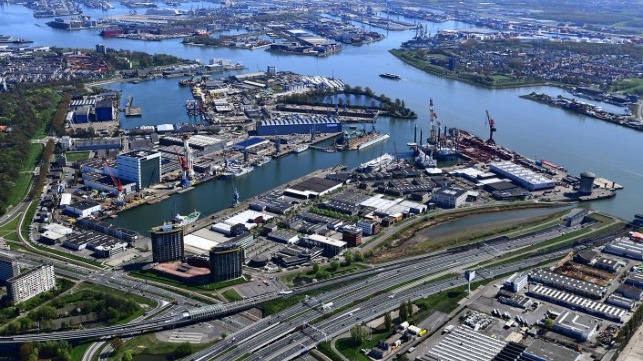EXTINCTION EVENT ONE MOMENT PLEASE
EU Ports Join Shipping Industry Calling for Revisions to Climate Plan

The European Sea Ports Organization said that it welcomes the European Commission’s new package of proposals, which should contribute to achieving the European Climate Law’s targets to reduce greenhouse gas emissions, but like many in the shipping industry is highlight additional efforts needed to reach the goals and support the ports during these transitions.
ESPO, which represents the port authorities, port associations and port administrations of the seaports of 22 Member States of the European Union and Norway, called the new “Fit for 55” proposals an “important first step towards reaching the European Green Deal ambition and the 2030 and 2050 goals enshrined in the EU Climate Law.”
The organization recognized the comprehensive elements with different proposals of relevance to ports. The specifically highlighted the proposals for an Alternative Fuels Infrastructure Regulation (AFIR), to increase the use of alternative fuels by shipping (FuelEU Maritime), the extension of the Emissions Trading System to shipping (EU ETS), amendments to the Renewable Energy Directive (REDIII), and an update of the Energy Taxation Directive.
“The fit for 55-proposals are an important first step,” said ESPO’s Secretary General Isabelle Ryckbost. “All the ingredients are there to deliver the green deal and climate goals. For Europe’s ports it is essential to ultimately achieve a policy that is effective in reducing emissions, is coherent, keeps an eye on the competitiveness of Europe’s port sector, is future-proof and does not create stranded assets or additional administrative burden for ports. It should take the diversity of the European port and maritime sector into due consideration.”
The organization said it will examine the proposals in depth and identify where the port pillar of this green deal architecture should be optimized. They are also highlighting key aspects that they believe have to be considered to complete the proposals.
ESPO said that it is seek coherence of the package, citing for example the need for full alignment between FuelEU Maritime and the proposal for an Alternative Fuels Infrastructure Regulation. The two different proposals they said must mirror each other and be considered together throughout the whole legislative process. The same goes for the other interrelated Fit for 55-proposals, which must be fully aligned.
They said there must also be efficiency in terms of emissions reductions. ESPO is calling for an efficient policy that truly delivers in terms of reducing emissions, avoids stranded assets, and is future-proof. A goal-based and technology-neutral approach that avoids one-size-fits-all solutions seems the best fit for this purpose, said Ryckbost. ESPO supports a framework that boosts innovation and progress, and enables bottom-up initiatives and coalitions of the willing, saying that it believes there is no time and no money to waste. Cooperation between all relevant stakeholders will be crucial since unilateral moves will not deliver.
Onshore power supply (OPS) they acknowledge is an important tool and part of the solution for lowering the shipping emissions at berth, but should not be seen as an end in itself. To ensure a rapid deployment of OPS and avoid a waste of public funds, Europe’s ports must be able to priorities and focus on deploying OPS where it makes sense in terms of delivering cost-effective reductions of greenhouse gas emissions and air pollution at berth. “It remains to see if the approach outlined in Article 5 of FuelEU Maritime and Article 9 in AFIR will lead to the right prioritization as part of an intelligent approach to OPS,” the ports organization said.
As the voice of the EU’s ports, the organization is also saying that it is important to safeguard the competitiveness of the European port and maritime sector, reducing the risk of encouraging ships to skip the EU for ports outside Europe. Ports also need a program that does not create administrative burden with unduly complicated calculations and compliance procedures.
“If Europe is to become fit for 55, it needs to fund for 55,” concluded Ryckbost. “The needed investments in ports to facilitate the greening of shipping are huge. Since there is no silver bullet to green the shipping sector, these are high risk investments with hardly any return on investment for the investing port authority.”
ESPO is calling on the EU to provide the funding necessary to support these initiatives. They said the package can only deliver if it is accompanied by sufficient support in terms of EU funding for investments in alternative fuels infrastructure, bunkering and production capacity, the retrofitting of existing ships and for the development of further onshore power facilities.
No comments:
Post a Comment